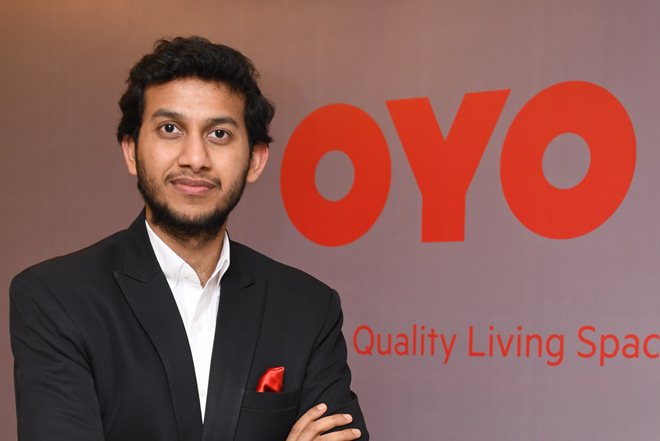BIOGRAPHY:
Millionaire without slums:
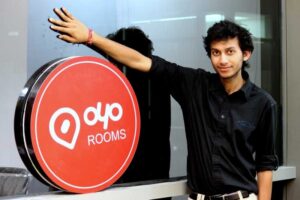
At the age of 17, Ritesh Agarwal dropped out of college and went into the hotel business, offering foreigners cheap, but at the same time so rare for budget Indian hotels, clean rooms that can also be booked online. Now OYO Rooms is the largest hotel chain in India: it includes 5,500 hotels located in 170 cities of the country. Over the course of several years, the company managed to expand into two other Asian countries, and on June 20, the company officially announced the start of expansion into China. The example is rare – few Indian companies dare to enter the Chinese market, where competition in most areas is more intense.
With a remote control for life:

24-year-old Ritesh Agarwal has felt a passion for entrepreneurship since childhood. At the age of 13, he sold SIM cards in the small town of Bissamkuttak in the northeastern state of Orissa (Odisha), where his family lived, and a little later, in high school, he took the train to Delhi every Saturday and went to events in which he participated startupers. In his own words, he already felt that higher education was not for him, and he looked at young entrepreneurs as gods solving complex problems related to real life.
In 2011, 17-year-old Agarwal dropped out of college, where he entered at the request of his parents, assembled a team of three programmers and, using $44 thousand raised from the VentureNursery accelerator, created the company Oravel Stays, which was a clone of the international giant Airbnb. Agarwal hoped to make the company successful in the national market without large investments. But he very quickly realized that nothing would work: the service he created was not popular – the owners of apartments and houses intended for rent in India preferred to look for tenants offline, and foreign tourists, seeing photos of the few apartments posted on the site, were horrified by the squalor of the housing.
A year later, Ritesh realized that he could not compete with small, cheap hotels, of which there are many in India. But the entrepreneur saw a different business opportunity – reading the comments that foreign tourists left on the Oravel website, he realized that most of them were dissatisfied with the dirt and unsanitary conditions inherent in many Indian hotels and rental houses. When he came to Delhi, he regularly stayed in cheap hotels and had the opportunity to appreciate their general level, terrifying for a Western tourist: sleeping receptionists, uprooted sockets, leaky mattresses, leaking pipes in the bathroom and the inability to pay with a credit card. The entrepreneur decided to change the concept of the project – rent an inexpensive hotel and provide cleanliness in the rooms and the minimum services necessary for comfort. If the business succeeds, it will be possible to scale the project.
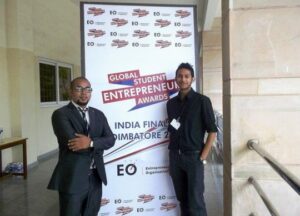
To restart the business, Agarwal needed money. The young man applied for a Thiel Fellowship grant: this fund, founded by American venture capitalist Peter Thiel in 2011, gives $100 thousand to young people under 23 who left school or university to start their own business. The concept of a chain of cheap hotels in which foreigners could book rooms online was of interest to representatives of the foundation: after going through four rounds of online interviews, Agarwal became the first Indian to win a grant from the foundation. The Thiel Fellowship paid for his three-week trip to the United States, during which he and his mentor were able to work out the new model in detail. Then, for two years, Agarwal received assistance from representatives of the foundation in the form of advice on business development.
First of all, the young entrepreneur agreed with a budget hotel in Gurgaon, a satellite city of Delhi. Agarwal spent ten months creating a mobile platform through which rooms could be rented out and renovating the hotel. The design of the application was taken from a platform used by taxi drivers working with the Indian aggregator Ola. And he named his new company On Your Own (OYO), which translates as “on your own.” Subsequently, the young man explained the choice of the name by a children’s complex – when he wanted to watch cartoons on TV, adults switched the channel to their favorite “soap operas”; Now the remote control from life is in his own hands, and he can independently choose what to do.
Following the example of Agarwal:

In 2016, St. Petersburg entrepreneurs Emil Urmanshin, Robert Sargsyan and Feyrouz Ragimov, inspired by the example of OYO Rooms, launched a similar service Roomp. “We learned about OYO when we were still at university, and we thought that this was the business model that was really changing the hotel services market for the better,” recalls Roomp CEO Emil Urmanshin. — For six months we closely monitored the company’s successes and studied the business model. At some point they came to the conclusion that it fits perfectly into the chaotic Russian market. In our country, 95% of all hotels are independent hotels, most of which are inferior in quality to chain competitors.”
Now through the Roomp service you can book about 2 thousand rooms in 100 hotels in ten cities (St. Petersburg, Moscow, Kazan, Sochi, Krasnodar, Tbilisi, etc.). In December 2017, the partners attracted venture capital investments – $250 thousand. Unlike OYO, the service has not switched to franchising, but operates according to the partnership model that Agarwal used initially – Roomp offers individual rooms in hotels of partners under its brand on the Internet. According to the project organizers, thanks to the World Cup, the rooms they offer now have one hundred percent occupancy. The creators of the project expect to reach payback in September 2018.
Cleanliness is the key to wealth:
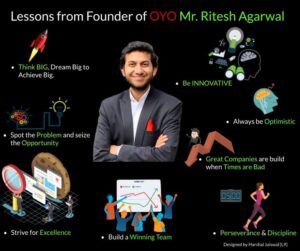
Within a few months of launching the service, Agarwal was convinced that the business model was working – the hotel was filled with poor foreign tourists. And the entrepreneur started scaling – he sent agents to the outskirts of New Delhi and the largest tourist cities of the country, who convinced the owners of hotels and hostels to rent out rooms through his service. The commission for OYO services was negotiated individually (the company does not disclose it). The main condition was the cleanliness of the rooms – no emergency plumbing, clean linen and towels. Agents chose hotels that would be easiest to “reach” the required level of quality. Moreover, among these hotels there was not a single one higher than three-star.
The owners agreed to work with OYO when they understood the advantages offered by offering rooms on the project’s website and application – foreign travelers usually looked for hotels on the Internet, but only a tiny part of the owners of budget Indian hotels posted information about themselves on social networks, or even more so on their own websites.
Cleanliness requirements have played a key role in attracting foreign tourists. Travelers are accustomed to the idea that cheap Indian hotels have dirty bathrooms, broken beds, and unwashed linen. Agarwal, who managed to break the stereotype, by June 2015 had turned OYO Rooms into India’s largest hotel chain – hotels in 70 cities in India offered about 13 thousand rooms.
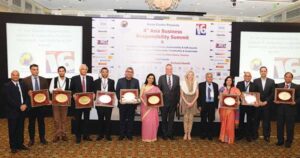
Since the beginning of 2016, the entrepreneur has been thinking about changing the terms of the franchise – Agarwal compiled a so-called standardization list of 150 points, guided by which the owners of an apartment or hotel had to bring their property into compliance with the requirements of the chain. Now, in any of the OYO Rooms, visitors were offered a modest but sufficient set of services and items for comfort: not only clean linen and a properly functioning bathroom, but also Wi-Fi, a flat-screen TV, air conditioning, and soft lighting. Currently, 80% of the company’s revenue comes from hotels that operate under the OYO brand and rent out all their rooms through this platform.
OYO agents constantly check the chain’s hotels and reviews of those who have stayed there, fining and even severing relations with those franchisees who failed to provide the required level of comfort. Agarwal himself regularly stays at various hotels in his chain to see how carefully the owners fulfill his list of requirements. At the same time, the company does not allow partners to raise prices. For example, a room in the historical center of Agra, near the Taj Mahal, costs $14 per day, and OYO apartments cost about the same in most popular destinations. Several auditors are involved in checking the financial affairs of hotels.
Now about 10% of the chain’s hotels are developing according to the so-called manchise (from English management plus franchise). This is a mixed management model that became widespread in the hotel business in the 2010s, mainly in Asian countries. With manchising, the owner of the management company completely takes over the management of the hotel owned by the franchisee for several years, builds all the processes and establishes service. And then the parties begin to work according to the usual franchising model.
Inhospitable hotels:

According to US hotel company HVS, India has about 112,000 chain hotel rooms and 1.8 million independent hotel rooms. Just 2% of those 1.9 million rooms can be booked online. According to the Indian Ministry of Tourism, in 2016, 8.8 million tourists visited the country, leaving $23 billion in the country. The top five countries from which the bulk of tourists come are Bangladesh, the USA, the UK, Canada and Malaysia. Travel abroad
The revenue of the network, which employs 1.5 thousand employees, amounted to about $1.02 billion in 2017; the company has still not made a profit – it is growing with investment money. In total, OYO managed to attract $450 million from investors, $100 million of which was invested by the Japanese Softbank in 2015, and $6 million by the American fund Sequoia Capital. Based on the latest deal, the company is valued at more than $1 billion. Media often call Agarwal “the face of the new India.”
The company is actively developing new business areas. At the beginning of 2017, she began working in a higher price segment, renting out apartments in townhouses. The OYO Townhouse chain of 25 apartment buildings initially opened in Bengal and Agarwal plans to expand it to 12 other regions in India by the end of 2018. In the summer of 2017, the company returned to the field that it had once left without a fight – the OYO Homes division is building a business based on the Airbnb model, offering 18 thousand rooms, apartments and houses in popular tourist destinations – Goa, Manali, Shimla, Pondicherry and so on.

“We found that there are many holiday homes in India that the owners are simply locking up because they cannot rent them out profitably,” says a company spokesperson. The commission at the launch of the project was 17%, then OYO raised it to 22%. True, there are already other national competitors in this niche – the Indian travel services MakeMyTrip, whose value is estimated at $3.6 billion, and the $218 million Yatra.
In 2016-17, OYO managed to expand into two other Asian countries – Malaysia and Nepal. The company began preparing the recently announced expansion into China several months ago – now the OYO website offers 11 thousand rooms in 26 cities in China – Hangzhou, Xi’an, Nanjing, Guangzhou, Chengdu, etc. Tourism in China is booming, Agarwal said, but the market in the country is as fragmented as in India, and this presents an opportunity to integrate small chains and individual hotels into the OYO network. “With our experience in managing hotel chains using the latest technology, we will strengthen our presence in the market, thereby enabling small local hotels to play in the same league as the giants of this industry,” assures Agarwal.
Ritesh Agarwal says so:

“It’s much more important to create something that 100 people are crazy about than something that 1,000 people “kind of like.”
“I have always believed that the best education is the one you get outside the classroom. Formal education never fascinated me because I didn’t understand how knowing what paths electrons take would help me solve problems in real life.”
“The crazier the idea, the easier it is to turn it into reality. The biggest risk is to avoid all risks.”
“Millennials often stay in hotels not to travel, but because they work late and don’t want to waste time on a long drive home.”
“The secret is not to do something new, the secret is to do ordinary things, but very well. It’s now or never—if you have a good idea, you can’t wait.”
